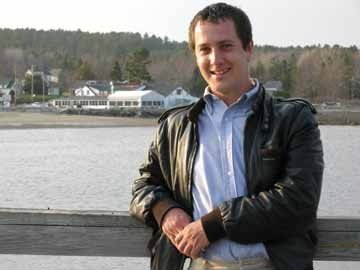
Incumbent Andrew O'Brien of Lincolnville says he has found his "sphere of influence" on the Agriculture, Conservation and Forestry Committee.
This article originally appeared in Village Soup, written by Sarah Reynolds.
Incumbent Andrew O'Brien is running for a second term as the representative for House District 44 because he feels he has found his "sphere of influence" serving on the Agriculture, Conservation and Forestry Committee and wants to continue the work he has begun toward establishing a local food economy in Maine.
Andrew O'Brien
• Town of residence: Lincolnville
• Party affiliation: Democrat
• Occupation: Teacher, Georges Valley High School; part-time landscaper
• Previous elective or appointive office: One term in Maine House representing District 44; served on the Agriculture, Conservation and Forestry Committee
• Clean elections candidate: Yes
House District 44 bridges Waldo and Knox counties, and includes the towns of Appleton, Hope, Islesboro, Liberty, Lincolnville, Morrill and Searsmont.
Concerning his interest in fostering a local food economy in the state, O'Brien said it's a good thing that Maine has many small farms, and not a lot of industrial farming. He wants to keep Maine's agricultural infrastructure intact and help struggling dairy farmers and its growing number of organic farms.
The most important issues facing the Legislature now are the funding gaps in the budget and the state pension system, he said.
Solving those problems is difficult because state revenues, up one month, down the next, are "a moving target." The Legislature must look closely at where it can streamline state government and find efficiencies, but also has to find a way to fund state operations without "dumping costs on the towns," he said.
He said he would be loath to cut further in natural resources areas. While there has been talk of reducing in the Department of Health and Human Services budget, he said he will be listening closely to proposals from his fellow legislators. He thinks the Legislature must "tread lightly" in making cuts and be aware of the effects of those cuts.
Regarding the pension system, O'Brien said, "I'm confident that we'll do something about it, because we have to." He said there is more pressure now to find a solution, because "voters are demanding action," and the Appropriations and Financial Affairs Committee and Joint Standing Committee on Labor will have to respond.
O'Brien sees the promise of new and well-paid jobs in the entrepreneurs he said are flocking to the Midcoast. He is also encouraged by the potential of the creative economy in this region. In addition, he favors expanding the availability of broadband Internet access to facilitate telecommuting.
On alternative energy, he said both solar and wind power have potential — as creators of jobs as well as providers of non-polluting energy — but it's important to think carefully about the effect of those industries on local communities and businesses. He thinks Maine should explore tidal power as well.
With regard to education, he said the property tax is the issue most on people's minds. "There's got to be a smarter way of funding [education]," he said, but he didn't offer any ideas about what that might be.
On the subject of health care, O'Brien said he is "very interested" in making sure everyone in Maine has access to the medical care they need. He does not think buying insurance across state lines would work for Maine. He said the Dirigo Health program "had good intentions, but didn't work out the way it was supposed to," and he expects the program to come up for some attention in the Legislature this session.
O'Brien said the majority of people served by the state's public-assistance programs genuinely need the help, and are self-supporting again within a year and a half, with only a small number needing help for longer. "A lot of people are very much stretched and they're very worried about their future," he said. He told about a 70-something grandmother he knows who is caring for her grandchildren. She is on Temporary Assistance for Needy Families and has a small home business, he said. "She's not living high on the hog."
He also said that TANF is a tiny share of the state budget — just 1.3 percent — adding that the state needs more programs to help people get off welfare, but "it's a very tough employment market."

No comments:
Post a Comment